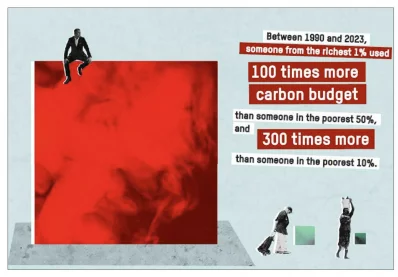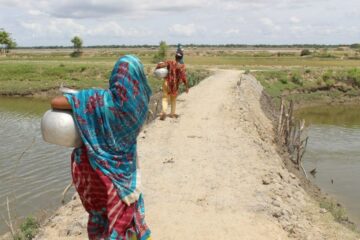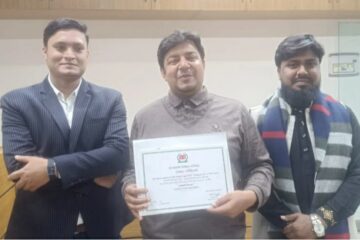The world’s wealthiest 0.1% emit more carbon dioxide in a single day than the poorest 50% produce in an entire year.
The report, Oxfam’s briefing Climate Plunder released Wednesday ahead of COP30 in Brazil, says a person in the richest 0.1% emits about 800 kilograms of CO2 a day versus roughly 2 kilograms for someone in the poorest half of humanity, highlighting stark inequalities in responsibility for the climate crisis.
Oxfam’s analysis, which combines consumption‑ and investment‑based accounting, finds that the richest 1% have consumed 15% of the global carbon budget since 1990.
Since the Paris Agreement in 2015 the richest 1% have used more than twice the remaining carbon budget as the poorest 50% combined.
Between 1990 and 2023 the richest 0.1% increased their share of emissions by 32%, while emissions from the poorest half fell by 3%.
At current rates, the remaining carbon budget consistent with limiting warming to 1.5°C will be exhausted within two years.
The report highlights the vast climate footprint embedded in billionaire investments.
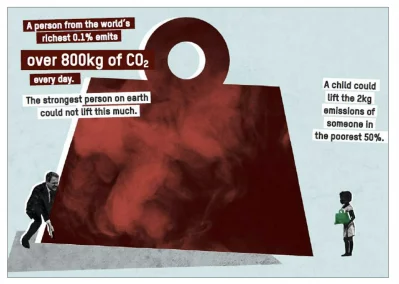
The combined investment portfolios of 308 billionaires produced an estimated 586 million tons of CO2 in 2024, more than the emissions of 118 countries.
Expanding the accounting to Scope 3 value‑chain emissions for 222 wealthy individuals yields 1.85 billion tons, roughly 4% of global emissions.
Almost 60% of these investments are concentrated in high‑impact sectors such as oil, gas and mining, and many corporate decarbonization plans remain incompatible with the 1.5°C target.
Beyond emissions figures, Climate Plunder documents how extreme wealth distorts policy and public debate.
Oxfam points to concentrated fossil‑fuel lobbying, disproportionate access for industry representatives at climate summits, media influence and the use of investor‑state dispute settlement mechanisms to challenge progressive climate measures.
The report notes that at COP29 some 1,773 coal, oil and gas lobbyists were granted access, outnumbering delegations from many climate‑vulnerable countries.
Oxfam links elite emissions to concrete harms, estimating that the emissions of the richest 1% will contribute to millions of heat‑related deaths and trillions of dollars in economic losses for low‑ and middle‑income countries if current trends continue.
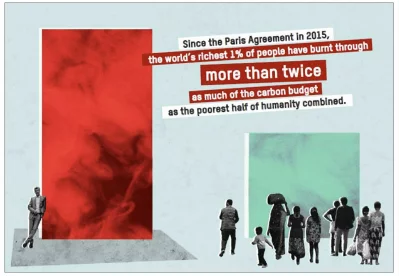
The briefing argues that this is not only an environmental crisis but an inequality crisis: a small group both drives emissions and shapes the rules that could rein them in.
Amitabh Behar, executive director of Oxfam International, said the findings demand urgent reforms, calling for measures such as taxing extreme wealth, banning fossil‑fuel lobbying, and ensuring meaningful participation of affected communities in climate decision‑making.
Ashish Damle, Oxfam country director in Bangladesh, described the report as exposing “a deep injustice” in which wealthy polluters profit while vulnerable populations face floods, hunger and displacement.
Oxfam calls on governments to adopt a suite of policies ahead of COP30 to cut elite emissions and rebalance power: permanent progressive taxes on income and wealth; levies on excess corporate profits; taxes or bans on carbon‑intensive luxury activities such as private jets and superyachts; strict limits on corporate political influence and lobbying; and rejection or reform of investor‑state dispute settlement clauses.

The briefing urges a fair‑share approach to the remaining carbon budget, stronger climate finance from rich countries, and systemic reforms of global economic institutions to protect the autonomy of Global South states.
The report stresses that to remain on a 1.5°C pathway the richest 1% and 0.1% would need to reduce per‑capita emissions by about 97% and 99% respectively by 2030.
Without rapid and deep cuts from the super‑rich and decisive policy action, Oxfam warns, extreme inequality in emissions will lock the world into increasingly catastrophic climate impacts. 